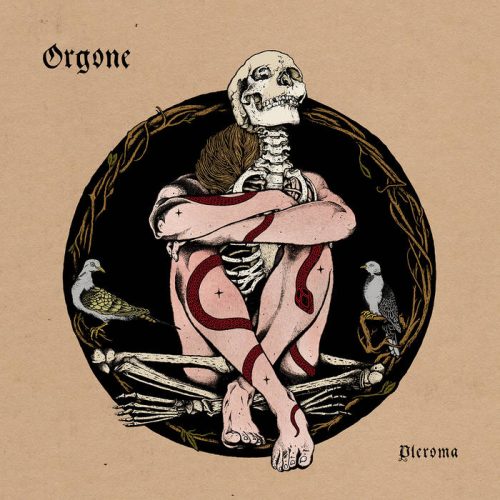
(Andy Synn is here to tell you to open your minds to the outstanding new album from Orgone)
As I’m sure most of you are aware by now, I consider genre terms to be a useful tool – in the right hands, anyway – to help guide and inform listeners, whether in general or specific terms, about what to expect (or not) when listening to a new band or album.
That being said, I don’t think bands should necessarily be limited or confined by genre traits and tropes if they don’t want to be (even if creativity often thrives within constraints).
After all, bands are just people, and people – in all their infinite diversity and infinity combinations – cannot (and should not) be defined by just a few, simplistic terms.
The human condition, you see, is less of a spectrum and more of an endlessly cascading kaleidoscope, one which looks different to everyone… and so is the art we produce.
Which is why trying to pin down the avant-garde, genre non-binary approach of Pittsburgh experimentalists Orgone would be a mistake (and a disservice to both the band and their audience).

Now, I know what you’re thinking (that’s right… I’m in your head) – that’s a pretty pretentious introduction, is Pleroma really that unusual and/or unorthodox?
Well, the answer is both yes and no.
Sure, on the macro scale the album as a whole is an incredibly (and impressively) complex and unpredictable piece of work – just take a look at the track list, where you’ll see that the eleven tracks which make up the band’s new album (their first in just over ten years) run the gamut from just under a minute and a half in length to almost eighteen – with the music whirling through passages of shimmering strings and bursts of shining brass, moody moments of noir-ish introspection and sequences of scintillating gypsy-jazz, all interpolated through the lens of an ostensibly “Metal” band more than willing to push the technical and musical extremes.
But, despite its complexity it’s also an unexpectedly catchy and compelling listen – comparisons, in that sense, can easily be made with the cinematic, genre-agnostic approach of Hypno5e or the esoteric extremity and talented technicality of early Extol – not just in reference to the melancholy instrumental melodies of tracks like “Approaching Babel” or the haunting “Ubiquitous Divinity”, or the captivating clean-sung catharsis of “Mourning Dove” and “Pleroma”, but also when considering the more mind-bending metallic moments of the album.
And while these are primarily clustered in the record’s three longest and most structurally ambitious tracks – with the one exception being the sublime slow-burn of “Hymne à la Beauté” – the overall effect of combining all these different elements is that each of these epic undertakings seems to absolutely fly by in the blink of an eye.
This is perhaps most notable during the titanic “Trawling the Depths” (which is not to say that the twisting, turning strains of “Valley of the Locust” or the maddeningly erratic, yet mesmerisingly hypnotic, “Schemes of Fulfilment” aren’t also, in their own way, of equal stature and status) where stunning sequences of avant-technical fretwork and soothing acoustic expressionism, punishing percussive patterns and gloomy atmospheric embellishments, hellaciously heavy grooves and achingly evocative ambience, all combine into something not just more than the sum of its parts but also much more than you or I would, or could, have expected.
It’s perhaps fitting then that just as I was putting the finishing touches on this piece I received an email hyping up the new Blood Incantation album as being “unlike anything you’ve ever heard before” – because while that remains to be seen (or, more accurately, heard) what we have here is an album (and it is most definitely an album, one which requires your complete and total attention and immersion to fully appreciate everything it has to offer, from its most minimalist to its most maximalist extremes) which truly doesn’t sound quite like anything, or anyone, else out there right now.

I agree with Andy Synn. Orgone has in their 2 previous outings (The Goliath, 2007 and ‘The Joyless Parson’ ,2014, shown so much creative and ebullient Tech DM musicianship, that I sensed {and hoped} that they would pull in or ectoplasmatically ingest other musics – which they do here true to the Pleroma concept (‘fullness of life’). Well, I did not expect bucolic and melancholy French chanson ‘clean’ singing, Hungarian rhythms, Russian o-tones, Maya flute et al but for most of it’s part in combination of the drama, the plaintive and nihilistic beauty of the incredible final reckoning riffing, beaten-dog barking, martial drumming, the serene beauty, torment and comedy of it all it works beautifully.
This album just keeps on giving. I haven’t heard anything that well-thought-through, that,smart, deep with so much dramatic urgency, musical and emotional knowledge, so powerful and moving for a very, very long time. Compared to its quicksilver nature, blazing technicality, joy of playing and that untiring omnipotently guitar flitting in and out the structures it builds most death metal sounds like ‘composed by numbers’!
What am I gonna listen to now? – after this musical fentanyl, there is almost no way of going back to more basic, repetitive and boring straight death music.
Those genre terms really only help up to a point. I think one of Pleroma’s messages is that a ‘genre’ -and abstract technical death metal is certainly a potently anti-bourgois one- can only say that much. With dm the messages are usual cynical and disillusioned ones while other music expresses different moods /discourses/’takes on life’. Only the diverse life- and freedom-affirming intermingling of a multitude of genres, styles and voices can give us the whole picture. This is both shattering and life-affirmative love and empathy propaganda.